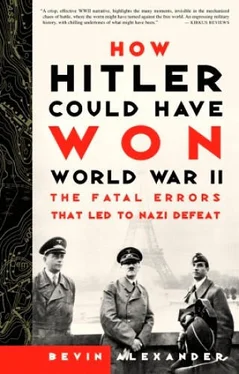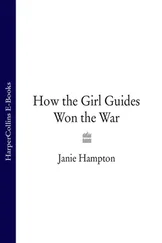But when Kleist ordered an assault on the river on May 13, he insisted that the Luftwaffe mount a massive bombing attack, using large numbers of bombers and dive-bombers. This might cause considerable damage, but then the aircraft would depart, leaving Guderian’s troops to face the remaining French machine guns and artillery.
When the Luftwaffe arrived, however, Guderian was astonished to see only a few squadrons of Stukas, operating under fighter cover. They used the tactics he had worked out beforehand: one group of Stukas bombed and machine-gunned trenches, pillboxes, and artillery positions (or pretended to do so), while a second group circled above, waiting to take over. Above these was a fighter shield. The air force had gone ahead with the original plan because it had no time to mount the massive bombing attack that Kleist wanted.
The effects were remarkable. When the assault force, 1st Rifle Regiment, assembled on the river just west of Sedan, enemy artillery was alert and fired at the slightest movement. But the unending strikes and faked strikes by the aircraft virtually paralyzed the French. Artillerymen abandoned their guns, and machine-gunners kept their heads down and could not fire.
As a consequence 1st Rifle Regiment crossed the river in collapsible rubber boats with little loss and seized commanding heights on the south bank. By midnight the regiment had pressed six miles south and set up a deep bridgehead, although neither artillery, armor, nor antitank guns had been able to get across the Meuse. Engineers could not finish building a bridge until daybreak on May 14.
The advance of the German infantry set off a mass retreat of French soldiers.
“Everywhere the roads were covered by artillery teams, ration and ammunition wagons, infantry weapons carriers, fatigue parties, horses, and motors,” Guy Chapman wrote. “What was worse, many of the groups were headed by officers, and, worse still, their guns had been abandoned.”
Meanwhile 10th Panzer Division had crossed the Meuse near Sedan and set up a small bridgehead, while Reinhardt’s panzer corps got a narrow foothold across the river at Monthermé. But the terrain was extremely steep there, and Reinhardt had a hard time holding on under strong French pressure.
At the same time Rommel’s 7th Panzer Division forced a large breach of the river at Dinant, about twenty-five miles north of Monthermé.
At dawn on May 14, Guderian pressed to get as many guns and tanks as possible across the one bridge that had been completed. He knew the French would try to destroy the bridgehead and were certain to be rushing reinforcements forward. At the moment, only Lieutenant Colonel Hermann Balck’s 1st Rifle Regiment—with not an artillery piece nor an antitank gun to its name—was holding the vital bridgehead.
The French commanders recognized the importance of destroying the bridgehead. The 3rd Armored Division was on hand and moved up, but some of its 150 tanks had been distributed to infantry divisions.
At 7 A.M. on May 14, fifteen French light tanks with infantry attacked 1st Rifle Regiment around Bulson, about five miles south of Sedan. They were supported by some French aircraft. The Germans had nothing heavier than machine guns, but shot down several planes and slowed the tanks and infantry long enough for the first German tanks to come up a few minutes later. By 9:40 A.M. only four of the French tanks remained, and they and the infantry retreated to Mont Dieu, a couple miles south.
Meanwhile British and French airmen tried bravely to knock out the single bridge over the Meuse and other spans under construction. The Luftwaffe provided no help against them, having been called away on other missions. But Guderian’s antiaircraft gunners shot down a number of Allied aircraft, and prevented any of the bridges being broken.
By midday German infantry and armor were approaching high ground near Stonne, about fifteen miles south of Sedan. This ridge dominated the country to the south, and guarded the Meuse crossings. Guderian turned over defense to General von Wietersheim, leaving the 10th Panzer Division and the independent Gross-Deutschland Infantry Regiment, now also on hand, until Wietersheim’s 14th Motorized Corps could come up and take over defense of the flank.
Guderian met with the commanders of 1st and 2nd Panzer Divisions (Friedrich Kirchner and Rudolf Veiel), and, with their eager concurrence, ordered them to turn west, break entirely through the French defenses, and strike for the English Channel. By evening of May 14, elements of the 1st Panzer had seized Singly, more than twenty miles west of Sedan.
The same evening, General André Corap, commanding the French 9th Army, the only force now blocking Guderian’s and Reinhardt’s panzer corps along the Meuse, made a fatal mistake and ordered the entire army to abandon the Meuse and withdraw to a new line some fifteen to twenty miles to the west. He made this decision not only because of the breakthrough at Sedan, but because Rommel’s 7th Panzer Division had crossed at Dinant. Corap was responding to wild reports of “thousands” of tanks pouring through the breach made by Rommel.
When the French arrived on the new line, Guderian’s panzers were already in some of the positions the 9th Army was supposed to have occupied, while withdrawal from the Meuse removed the block holding up Reinhardt at Monthermé. His tanks now burst out and drove westward along an unobstructed path. Guderian and Reinhardt had split the 9th Army in two, blowing open a sixty-mile-wide hole through which their panzers poured like a raging torrent.
The battle of Sedan brought about a major change in battle tactics. Up to this point, panzer leaders, including Guderian, had believed rifle and armored units should be kept sharply distinct, and that tanks should be massed for a decisive thrust. Thus the 1st Rifle Regiment crossed the Meuse with only light infantry weapons. If the French had attacked with heavy weapons during the night of May 13–14, they might have destroyed the regiment.
The infantry remained in a precarious position on the morning of May 14 until the first panzers came up. It would have been safer and more effective for the Germans if individual tanks and antitank guns had been ferried across with the infantry. The lesson led to formation of Kampfgruppen— mixed battle groups—of armor, guns, infantry, and sometimes engineers. These proved to be formidable fighting forces and dominated German tactical operations for the remainder of the war.
Churchill arrived in Paris on May 16 to find panic setting in. Government offices were burning their papers, expecting the capital to fall at any moment. The turmoil slowly abated as word spread that an order taken from a wounded German officer showed the panzers were turning toward the west, not Paris.
Premier Reynaud reported that Gamelin had no more reserves—or ideas. He took over the defense establishment from Daladier, relieved Gamelin, appointed General Maxime Weygand, just arriving from Syria, to command the armies, and named the ambassador to Spain, Marshal Henri Philippe Pétain, as vice president of the cabinet. Weygand arrived at the front on May 21, but was unable to conceive any plan to reverse the disaster unfolding for the Allies.
Kleist’s panzers were rolling through territory that resembled a long corridor. The region was clogged with fugitives who created chaos, while the panzers at the arrow point had to be nourished with ammunition, food, and fuel. Walls had to be formed on either side, in case the Allies were massing to counterattack. Wietersheim’s 14th Motorized Corps was trying to keep up with the tanks and form blocking positions. But their numbers were too small and the distances too great. Solid lines could only be created by the infantry, most of it still far behind. Rundstedt was doing everything possible to bring them forward, but the pace was slow, gaps were impossible to close, and, to the orthodox soldiers who made up the German senior command, perils lurked at every crossroad.
Читать дальше


![Джонатан Димблби - Barbarossa - How Hitler Lost the War [calibre]](/books/385421/dzhonatan-dimblbi-barbarossa-how-hitler-lost-the-w-thumb.webp)









